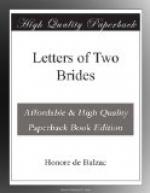“In a word, there are only two parties—the party of Marius and the party of Sulla. I am for Sulla against Marius. This, roughly speaking, is our position. To go more into details: the Revolution is still active; it is embedded in the law and written on the soil; it fills people’s minds. The danger is all the greater because the greater number of the King’s counselors, seeing it destitute of armed forces and of money, believe it completely vanquished. The King is an able man, and not easily blinded; but from day to day he is won over by his brother’s partisans, who want to hurry things on. He has not two years to live, and thinks more of a peaceful deathbed than of anything else.
“Shall I tell you, my child, which is the most destructive of all the consequences entailed by the Revolution? You would never guess. In Louis XVI. the Revolution has decapitated every head of a family. The family has ceased to exist; we have only individuals. In their desire to become a nation, Frenchmen have abandoned the idea of empire; in proclaiming the equal rights of all children to their father’s inheritance, they have killed the family spirit and created the State treasury. But all this has paved the way for weakened authority, for the blind force of the masses, for the decay of art and the supremacy of individual interests, and has left the road open to the foreign invader.
“We stand between two policies—either to found the State on the basis of the family, or to rest it on individual interest—in other words, between democracy and aristocracy, between free discussion and obedience, between Catholicism and religious indifference. I am among the few who are resolved to oppose what is called the people, and that in the people’s true interest. It is not now a question of feudal rights, as fools are told, nor of rank; it is a question of the State and of the existence of France. The country which does not rest on the foundation of paternal authority cannot be stable. That is the foot of the ladder of responsibility and subordination, which has for its summit the King.
“The King stands for us all. To die for the King is to die for oneself, for one’s family, which, like the kingdom, cannot die. All animals have certain instincts; the instinct of man is for family life. A country is strong which consists of wealthy families, every member of whom is interested in defending a common treasure; it is weak when composed of scattered individuals, to whom it matters little whether they obey seven or one, a Russian or a Corsican, so long as each keeps his own plot of land, blind, in their wretched egotism, to the fact that the day is coming when this too will be torn from them.




